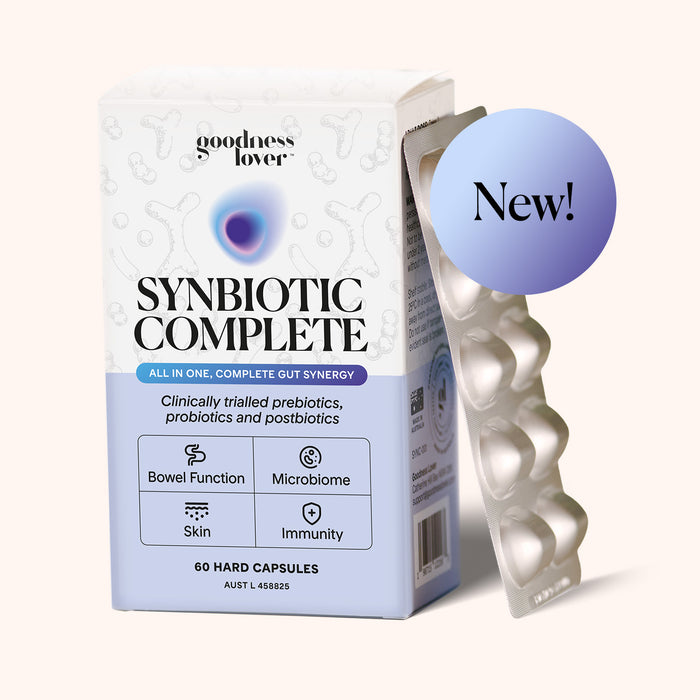Remember when probiotics were the new kid on the block? Those "good bacteria" promised to revolutionize our health, and suddenly everyone was talking about yogurt cultures and fermented foods. Then came prebiotics—the "food" that feeds those beneficial bacteria. Now, there's an exciting new player in the gut health game that's capturing the attention of researchers and health enthusiasts alike: postbiotics.
If probiotics are the workers and prebiotics are their fuel, postbiotics are the valuable products they create. These are the beneficial compounds that your gut bacteria produce when they're happy, healthy, and well-fed. In many ways, postbiotics might be the most important piece of the puzzle we've been missing.
In this article, we'll explore what postbiotics are, why scientists are so excited about them, and how they might transform the way we think about gut health. Whether you're a gut health veteran or just beginning to understand the importance of your microbiome, postbiotics represent a fascinating frontier that could change everything we thought we knew about supporting our digestive wellness.
Let’s dive in.
Table Of Contents:
What Are Postbiotics?
To understand postbiotics, imagine your gut as a bustling factory. Probiotics are the skilled workers, prebiotics are the raw materials they need to do their jobs, and postbiotics? They're the valuable finished products that come off the production line.
More specifically, postbiotics are the non-viable, beneficial compounds that probiotic bacteria produce during their natural life processes. When these good bacteria feast on prebiotic fibers and go about their daily business of living, growing, and reproducing, they create a treasure trove of health-promoting substances. These byproducts—ranging from vitamins and enzymes to specialized fatty acids and proteins—are what we call postbiotics.
This process is called fermentation, and it's the same basic principle behind making yogurt, kimchi, or sourdough bread. Your gut bacteria take indigestible fibers (the prebiotics) and transform them into compounds your body can actually use. The difference is that this fermentation is happening inside you, creating fresh postbiotics that immediately benefit your health.
Some of the most important postbiotics include short-chain fatty acids (like butyrate, which feeds your intestinal cells), bacteriocins (natural antimicrobial compounds), and various vitamins (particularly B vitamins and vitamin K), which your gut bacteria produce and your body absorbs. There are also specialized enzymes that help break down food, peptides that support immune function, and various metabolites that influence everything from mood to metabolism.
What's revolutionary about this understanding is that postbiotics might actually be the "active ingredients" we've been seeking all along. While we've focused on getting live bacteria into our systems, it turns out that what those bacteria produce might be even more important than the bacteria themselves.
Health Benefits of Postbiotics
The research on postbiotics is revealing impressive health benefits that extend far beyond just digestive wellness. These beneficial compounds are proving to be powerful allies for your entire body!
What scientists have long suspected about the gut's influence on overall health is now being validated through exciting studies that show postbiotics working their magic across multiple body systems.
Gut barrier function and intestinal health
One of the most significant benefits of postbiotics is their ability to strengthen your intestinal barrier. A 2009 study found that butyrate, a key postbiotic, directly feeds the cells lining your intestines, helping maintain the tight junctions that keep harmful substances from leaking into your bloodstream. This "leaky gut" protection is fundamental to preventing systemic inflammation and supporting overall health. Postbiotics also help create a healthier gut environment by supporting the growth of beneficial bacteria while decreasing harmful ones. They lower intestinal pH, making conditions favorable for beneficial microbes like Bifidobacteria and Lactobacillus while inhibiting pathogens such as E. coli and Salmonella.

Inflammation and immune system support
Your gut houses about 70-80% of your immune system, so it makes sense that postbiotics would have profound immune effects. Research has demonstrated that specific postbiotic compounds can modulate the immune response by upregulating anti-inflammatory molecules while reducing excessive inflammatory responses. This balanced immune support helps your body fight off infections while preventing autoimmune reactions. They may also help protect against other inflammatory conditions including arthritis and inflammatory bowel disease.
Metabolic health and blood sugar regulation
Research also shows that postbiotics may help with weight management and blood sugar control. Some of these beneficial compounds appear to support healthy metabolism, which could be helpful for maintaining a healthy weight and stable energy levels.
Cardiovascular benefits
The heart-health benefits of postbiotics are gaining attention too. These beneficial compounds may help support healthy heart function through their ability to aid metabolic regulation and reduce inflammation throughout the body. For example, research has shown that short-chain fatty acids like butyrate can help maintain healthy cholesterol levels and support normal blood pressure, suggesting that postbiotics could be valuable allies for cardiovascular wellness.
Potential cancer-protective effects
Early research indicates that certain postbiotics, particularly butyrate, may have cancer-protective properties. Studies have shown that butyrate can promote healthy cell division and may help prevent the development and progression of colorectal cancer.
Mental health and gut-brain axis
Perhaps most intriguingly, postbiotics appear to influence mental health through the gut-brain connection. Research shows that specific bacterial metabolites can act as signalling molecules that influence mood-related pathways. Postbiotics may also support neuroplasticity and combat oxidative stress to help prevent cognitive decline.

Postbiotics vs. Probiotics and Prebiotics
Postbiotics offer remarkable advantages that make them stand out in the crowded world of gut health supplements. Unlike their living probiotic cousins, postbiotics don't need babying—they're stable at room temperature, won't lose potency over time, and aren't destroyed by stomach acid, antibiotics, or bile salts that often render probiotics ineffective. This makes them ideal for people with compromised immune systems who need to avoid live bacteria while still getting powerful microbiome support.
What sets postbiotics apart is their precision and gentleness. You know exactly what beneficial compounds you're receiving and in what amounts, with effects that begin immediately rather than waiting for bacteria to colonize your gut. Unlike probiotics, which can cause uncomfortable gas, bloating, or digestive upset as your system adjusts to new bacteria, postbiotics typically work without these side effects.
Perhaps most importantly, postbiotics deliver consistent results regardless of your individual gut environment. Their effectiveness doesn't depend on whether bacteria successfully establish themselves in your unique microbiome, making them reliable for everyone.
The ideal approach might be using all three "biotics" strategically—prebiotics from whole foods to nourish existing gut bacteria, probiotics to restore beneficial bacteria after illness or antibiotic use, and postbiotics for immediate, dependable support when you need it most.
Food Sources and Supplementation
The good news about postbiotics is that you're probably already consuming some of them without even realizing it. Every time you enjoy fermented foods, you're getting a dose of these beneficial compounds that bacteria have thoughtfully pre-made for you.
Natural food sources
Fermented foods are your best bet for naturally occurring postbiotics. Think of foods like (plant-based) yogurt, kefir, sauerkraut, kimchi, miso, and kombucha—these aren't just delivering live bacteria, they're also packed with the beneficial compounds those bacteria produce during fermentation.
Other surprising sources include sourdough bread (the fermentation process creates postbiotics), apple cider vinegar with the "mother," and even some pickled vegetables. The key is looking for foods that have undergone natural fermentation rather than just being pickled in vinegar.
Supplement options
As science reveals the potential of postbiotics, these supplements are becoming more available. You'll find them in convenient capsule or powder forms, packed with concentrated beneficial compounds like butyrate, bacteriocins, and other powerful bacterial metabolites. Some supplements combine multiple postbiotic compounds for broader benefits.
Leading examples include postbiotics from Lactobacillus salivarius AP-32 and Lactobacillus plantarum LPL-28, which target upper digestive health, maintaining balance from your mouth to stomach and strengthening your upper digestive defenses. For lower digestive support, formulas may include postbiotics from strains like Lactobacillus salivarius AP-32 and Bifidobacterium longum subsp. infantis BLI-02 to protect your intestinal lining and optimize your gut environment.
When choosing a postbiotic supplement, look for products that clearly list the specific compounds included and their amounts. Quality manufacturers will provide third-party testing results and specify which bacterial strains were used to produce the postbiotics. Steer clear of products hiding behind vague terms like "fermentation extracts" without giving you the details.
Since we're still in the exciting early days of postbiotic research, optimal dosages are being fine-tuned. Start with the manufacturer's recommended dose and tune into how your body responds. Unlike probiotics, you don't need to worry about "die-off" reactions, but it's still wise to introduce any new supplement gradually. Most people can take postbiotics with or without food, making them more convenient than many probiotic supplements that require specific timing.
The Future of Postbiotics
The postbiotic revolution is just beginning. Researchers are developing targeted therapies for specific conditions like IBD and depression, moving beyond general gut health into precision medicine. As microbiome testing advances, we may be able to create truly personalized postbiotic protocols based on your unique gut needs.
Major supplement companies are investing heavily in this space, suggesting postbiotics will soon be as common as probiotics on store shelves. This represents a fundamental shift from hoping live bacteria will work to directly providing the beneficial compounds our bodies actually need.
What makes this particularly exciting is that postbiotics might finally democratize gut health benefits.
You won't need to worry about whether you can handle fermented foods, keep live bacteria alive in your stomach, or create the perfect environment for probiotics to work. Instead, you get direct access to the beneficial compounds that actually drive health improvements.
As we enter this new era of gut wellness, postbiotics offer something we've been searching for: a simple, gentle, and reliable way to support your gut. Whether you're struggling with digestive problems, want to strengthen your immune system, or just feel your best overall, postbiotics could be a game-changing tool. The future of gut health isn't just about feeding good bacteria—it's about harnessing the powerful compounds they create.














What Do You Think? Comment Below: